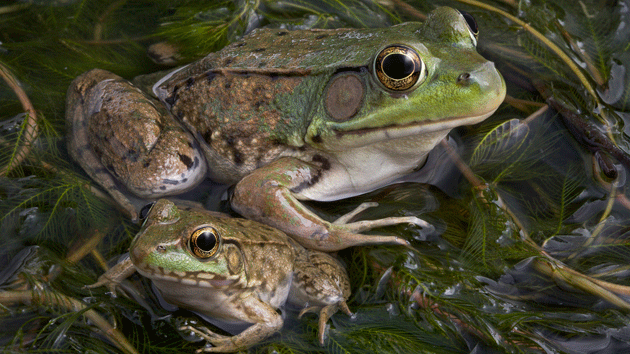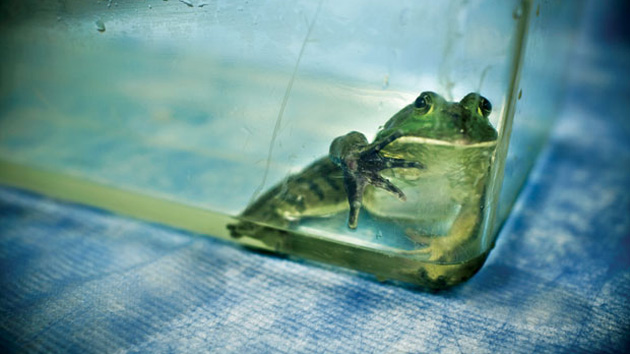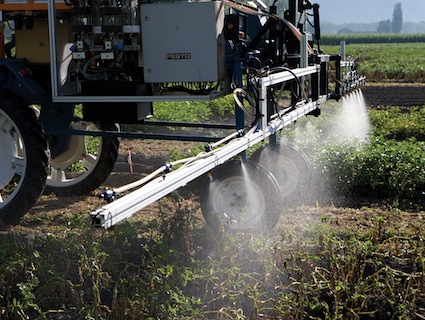
<a href="http://www.thinkstockphotos.com/image/stock-photo-baby-and-adult-bullfrogs/176881529/popup?al=461121321,imsis250-181,sb10070105i-001,461158545,465460037,464356023,103578124,160111505,122423379,144219155,160840679,153952591,178462924,153855372,80292589,155252239,106533491,161865802,79861280,178432594,148457423,83315592,175859668,87354609,147298485,106534832,147315653,153030465,184387848,179594907,91993816,177541129,187629704,185038906,126404188,452535247,80292588,176881529,450062691,160103063,187632032,174561204,173664708,77742325,463401029,459643481,78229134,459643667,179575111,179020700,178737953,80292592,178742206,77742327,178508320,453624183,178017629,177854400,453059513,166345455&sq=frog%20close%20up/f=CPIHVX/s=DynamicRank" target="_blank">CathyKeifer</a>/ThinkStock
In the February 10 issue of the New Yorker, Rachel Aviv has an outstanding piece on Tyrone Hayes, the University of California-Berkeley biologist whose research found that atrazine, a widely used herbicide, caused extreme sexual-development problems in frogs at very low levels. Aviv’s article follows a superb Hayes profile by Dashka Slater published in Mother Jones in 2012. Aviv’s piece gives some key background on just why it’s so hard for the US Environmental Protection Agency to take action on chemicals like atrazine, which in addition to harming frogs, is also suspected of causing thyroid and ovarian cancers in people at low doses. Here’s the key bit regarding the EPA and its reliance on cost-benefit analyses to determine what chemicals the public can and cannot be exposed to:
In the U.S., lingering scientific questions justify delays in regulatory decisions. Since the mid-seventies, the E.P.A. has issued regulations restricting the use of only five industrial chemicals out of more than eighty thousand in the environment. Industries have a greater role in the American regulatory process—they may sue regulators if there are errors in the scientific record—and cost-benefit analyses are integral to decisions: a monetary value is assigned to disease, impairments, and shortened lives and weighed against the benefits of keeping a chemical in use. Lisa Heinzerling, the senior climate-policy counsel at the E.P.A. in 2009 and the associate administrator of the office of policy in 2009 and 2010, said that cost-benefit models appear “objective and neutral, a way to free ourselves from the chaos of politics.” But the complex algorithms “quietly condone a tremendous amount of risk.” She added that the influence of the Office of Management and Budget, which oversees major regulatory decisions, has deepened in recent years. “A rule will go through years of scientific reviews and cost-benefit analyses, and then at the final stage it doesn’t pass,” she said. “It has a terrible, demoralizing effect on the culture at the E.P.A.”
Hat tip: Kathleen Geier.
















